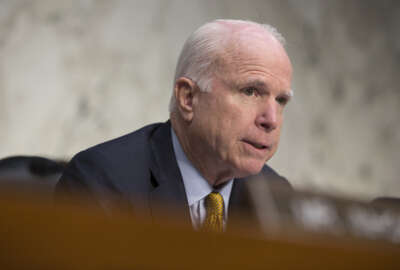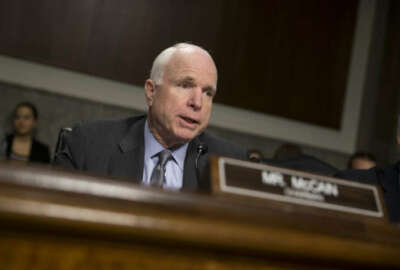
Kaine considering McCain’s bump in defense spending
A senator representing one of the largest concentrations of federal workers says he'll see what happens when Sen. John McCain's (R-Ariz.) amendment hits the Sen...
Sen. Tim Kaine (D-Va.), who represents a state with one of the largest numbers of federal workers, said he’s not ruling out the possibility of voting for a $17 billion increase in Defense Department funding for 2017.
Last week, Senate Armed Services Chairman John McCain (R-Ariz.) introduced an amendment to the 2017 defense authorization bill that would pay for an increase in the raise for active duty service members and stop the Army troop drawdown.
“I’m going to see what happens on the floor, but at the end of the day we have to figure out a sequester solution, not just for defense but for nondefense too,” Kaine told Federal News Radio. “Hopefully, we’ll get to the same place as we did last year where we did provide relief from the harsh [Budget Control Act] caps on the defense side and we did it on nondefense too.”
McCain’s amendment puts most of the money in an emergency war fund that is not subject to sequestration. The House and Senate Armed Services and Appropriations Committees have funded DoD to — or close to — the limits set by the caps set by the 2015 budget deal.
That means if any more money were to be allocated toward DoD it would trigger sequestration cuts, unless it’s put into the emergency account. The emergency account is officially called the Overseas Contingency Operations (OCO) account.
In the past, critics of the emergency war fund said it acts as a gimmick to increase defense funding past sequestration caps, without rising caps so more can be spent on the domestic budget. They particularly object to putting programs that should be paid with base budget funds in the contingency fund that is supposed to be exclusively for war efforts.
Last week, the Stimson Center released a report stating emergency war funding is undermining budget controls and contributing to larger deficits.
The report stated the fund was generating insecurity in the DoD workforce and creating long-term uncertainty in defense planning.
“Given the consequences of continued misuse … we suggest that President Obama and his successor develop and commit to a credible plan to wind down OCO funding beginning with the expiration of the Bipartisan Budget Act in FY2018,” the report states.
Kaine said he introduced an amendment that has been embraced by the Senate Armed Services Committee that calls for a solution to sequester for defense and nondefense.
“It’s no surprise the committee embraces it because [the Homeland Security Department] is important to defense, the FBI is important to defense, the [Drug Enforcement Administration] is important to defense,” Kaine said.
Last year, President Barack Obama vetoed the defense authorization bill because it used too much of the emergency funds to pay for things like operations and maintenance.
The House defense authorization and defense appropriations bills have already built in extra funds for DoD through some budgetary acrobatics, a move critics have decried as well.
The House Armed Services Committee plans to take $18 billion from OCO and move it into the base budget. That $18 billion would be used to fund an increased military pay raise and to bolster troop levels by 27,000.
What would be left in OCO is $41 billion, instead of the original $59 billion requested by the President. That’s enough to cover the wars until April 2017.
At that point, if the new President wants more money, he can ask Congress for an additional wartime fund.
Defense Secretary Ash Carter has already expressed his displeasure over how the House plans to increase the defense budget.
“It’s gambling with warfighting money at a time of war, proposing to cut off funding for ongoing operations in the middle of the fiscal year. Moreover, it would spend money taken from the war account on things that are not DoD’s highest priorities across the joint force,” Carter said, during a speech this week. “And it’s another road to nowhere, with uncertain chances of ever becoming law, and a high probability of leading to more gridlock and another continuing resolution — exactly the kind of terrible distraction we’ve seen for years, that undercuts stable planning and efficient use of taxpayer dollars, dispirits troops and their families, baffles friends and emboldens foes.”
The White House said the President would veto the House plan if it came to his desk.
Copyright © 2024 Federal News Network. All rights reserved. This website is not intended for users located within the European Economic Area.
Scott Maucione is a defense reporter for Federal News Network and reports on human capital, workforce and the Defense Department at-large.
Follow @smaucioneWFED





